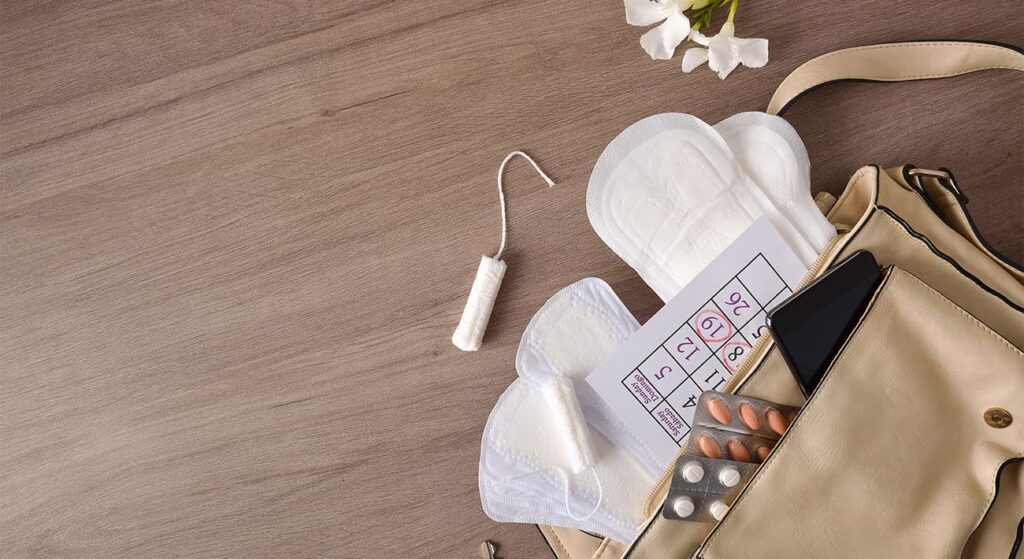Over the past few years, there have been several effects of the covid-19, including, it seems, on menstrual cycles. Many have acknowledged menstrual alterations. Some reporting changes after contracting the virus and others after receiving the vaccine. Disruptions did not follow any for some people, yet they experienced them. But before attempting to identify the cause of these alterations, it is necessary to understand that everyone’s cycles vary. Even though a 28-day cycle with five days of bleeding is assumed to be usual, this is merely an estimate. Most women do not live in such a reality.
Indeed, menstrual bleeding duration, heaviness, and cycle period vary naturally across individuals and even within the same person. But the brain’s hypothalamus and pituitary gland, alongside the ovaries (collectively referred to as the HPG axis), regulate a combination of hormones responsible for controlling the menstrual cycle. The body’s ability to release these hormones from the axis may be disturbed, which affects the duration and symptoms of the monthly flow, among other things.
Effects of Covid-19 Infection on the Menstrual cycle
The menstrual cycle encompasses intricate interactions among diverse tissues, hormones, and organ systems. Because of this, the menstrual cycle is susceptible to both internal and external conditions, like infection and alterations in lifestyle. The menstrual cycle may be affected by covid-19 contamination, vaccines, or mental stress brought on by the COVID-19 crisis.
When confronted with a chronic virus, like the covid-19, the body momentarily suppresses ovulation which may affect monthly bleeding to refocus energy on preventing infection rather than on reproduction. Another factor could be COVID’s extreme inflammatory effects, which influence menstrual cycle irregularities. The following are effects on the menstrual cycle:

Irregular Menstruation
Your menstrual cycle may be shorter or longer than usual. These periods are usually (but not always) light. Constant changes equally occur.
Heavy flow
Menorrhagia is another name for this. When you have a heavy period, you lose more blood than usual or have a flow that lasts longer than six days.
Light periods
These menstrual flows are unusual and have a shorter duration of blood loss. It is also known as hypomenorrhea
Missed period
Missing periods are called amenorrhea. You are commonly said to have amenorrhea if you have not had a period for about 2- 3 consecutive months. Delayed periods also fall into this category.
Furthermore, irregular menstruation is related to increased levels of stress. The COVID-19 infection and crisis have acted as stressors as it has altered the lives of many in various ways ( job loss, poverty and mental health). And many medical practitioners suggest it has significantly affected menstruation. A recent analysis found that persons with a severe perceived stress scale (PSS) bled heavily and for long periods than individuals with a normal COVID-19 PSS.
Additionally, there has been a lot of media publicity about the COVID-19 vaccine’s link to irregular menstrual cycles. Thousands of menstrual irregularities presumed to be induced by vaccination were reported, following the administration of all recognized COVID-19 vaccines up to February 2022. The reports included some of these; heavier-than-usual periods, delayed periods, and unexpected vaginal bleeding. A less than 1-day increase in cycle length, but not an increase in menstrual period, was linked to COVID-19 vaccination as well. The most prevalent changes were shorter menstrual cycles, prolonged periods, and lighter flow than usual.
Therefore, it appears that both the covid-19 vaccine and coronavirus infection can influence a woman’s menstruation. Although not conclusively established, it is also possible that pandemic stress has a similar effect. These alterations seem to go away after a few months, but if you develop new problems with your menstrual cycle or if the variations persist, contact your doctor immediately. Keep in mind that a variety of diseases and disorders might disrupt menstruation. Physical and psychological stress can also have a significant impact. If you are worried about covid-19 or your flow, you can visit the PCR clinic in Leicester Square for a medical checkup.







